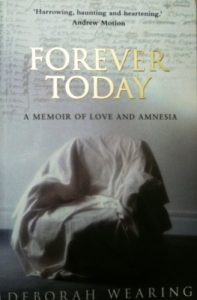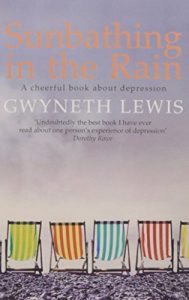 How far can you have a personality without memory of your own story? Today, as our society includes ever increasing numbers of people with dementia, that question is asked more and more often. Clive Wearing is at the extreme end of those with no memory, although in his case the loss of memory followed an encephalitis. In Forever Today, his wife Deborah describes Clive and his daily struggles with encountering the world and himself in it. It is poignant, upsetting, at times comedic, and profoundly thought-provoking about what things come together to make us human. Various clips and documentaries … Read more...
How far can you have a personality without memory of your own story? Today, as our society includes ever increasing numbers of people with dementia, that question is asked more and more often. Clive Wearing is at the extreme end of those with no memory, although in his case the loss of memory followed an encephalitis. In Forever Today, his wife Deborah describes Clive and his daily struggles with encountering the world and himself in it. It is poignant, upsetting, at times comedic, and profoundly thought-provoking about what things come together to make us human. Various clips and documentaries … Read more...
Month: September 2017
William Styron – Darkness Visible
 This slim text, only 84 pages in the paperback Picador edition, is an eloquent description by an American novelist of his experience of depression in 1985-6, and his subsequent gradual emergence from the darkness. The account of the ‘storm’ that brought William Styron into an acute psychiatric ward in December 1985 was first published in 1989, first as a lecture and then as an article in Vanity Fair. In part he seems to be responding to recent public reactions to suicides, among others that of Primo Levi, novelist and survivor of Auschwitz, in 1987. As someone who got to … Read more...
This slim text, only 84 pages in the paperback Picador edition, is an eloquent description by an American novelist of his experience of depression in 1985-6, and his subsequent gradual emergence from the darkness. The account of the ‘storm’ that brought William Styron into an acute psychiatric ward in December 1985 was first published in 1989, first as a lecture and then as an article in Vanity Fair. In part he seems to be responding to recent public reactions to suicides, among others that of Primo Levi, novelist and survivor of Auschwitz, in 1987. As someone who got to … Read more...
Stephen Fry – The Secret Life of a Manic Depressive
 This documentary is part-confessional, and part-documentary, including filming of Stephen Fry at places associated with critical moments of his life – his school, the theatre where he had his breakdown, the garage where he attempted to commit suicide, a recreation of his flight overseas afterwards, and the story of his treatment. In between these filmed confessionals there are important sections about the nature of manic depression and interviews with researchers at Cardiff and Aberdeen Universities, and visits to an acute psychiatric unit and interviews with other people with bipolar ‘disorder’.
This documentary is part-confessional, and part-documentary, including filming of Stephen Fry at places associated with critical moments of his life – his school, the theatre where he had his breakdown, the garage where he attempted to commit suicide, a recreation of his flight overseas afterwards, and the story of his treatment. In between these filmed confessionals there are important sections about the nature of manic depression and interviews with researchers at Cardiff and Aberdeen Universities, and visits to an acute psychiatric unit and interviews with other people with bipolar ‘disorder’.
There is a very important discussion on the merits and … Read more...
Gwyneth Lewis – Sunbathing In The Rain
 Gwyneth Lewis’ book about her experience of depression is in sharp contrast to those of William Styron or Stuart Sutherland. It is longer than both of the others but in smaller bite-sized chunks of reminiscence or description, or suggested rules for the depressed, or guidelines for carers, all interspersed with bizarre newspaper stories, and quotations from authors ranging from Kirkegaard to Lewis Carroll. Running through it all is a positive thought that may not be shared by all who have experienced depression. This thought is that her depression came out of an internal contradiction within her original way of life, … Read more...
Gwyneth Lewis’ book about her experience of depression is in sharp contrast to those of William Styron or Stuart Sutherland. It is longer than both of the others but in smaller bite-sized chunks of reminiscence or description, or suggested rules for the depressed, or guidelines for carers, all interspersed with bizarre newspaper stories, and quotations from authors ranging from Kirkegaard to Lewis Carroll. Running through it all is a positive thought that may not be shared by all who have experienced depression. This thought is that her depression came out of an internal contradiction within her original way of life, … Read more...
Jean-Dominique Bauby – The Diving-Bell and the Butterfly
 How can we even imagine what it must be like to have Locked-In Syndrome? Unable to move anything, but still completely conscious and aware. The account by Jean-Dominique Bauby challenges us to make the effort to do exactly that.
How can we even imagine what it must be like to have Locked-In Syndrome? Unable to move anything, but still completely conscious and aware. The account by Jean-Dominique Bauby challenges us to make the effort to do exactly that.
The Diving Bell and the Butterfly comes in several formats and each have their strengths. There is the book which was a sensation when it was first published in 1997 and which has since been translated into many languages. The French feature film was released in 2007 with an amazing performance by Mathieu Amalric. It is clear from this film that … Read more...
Tony Judt – The Memory Chalet
In his essay ‘Night’, historian Tony Judt gave his personal take on one particular aspect of Motor Neuron Disease (or Amyotrophic Lateral Sclerosis since he was living in the United States at the time). At the stage of writing this essay Judt was almost completely paralysed, but with no swallowing or jaw symptoms, and therefore able to dictate his thoughts. (Films of him in his last year – see the foot of this page – show that despite his nasal respiratory support he struggled to make a lot of sound when he spoke.)
The essay concerns the loneliness and isolation … Read more...
Michael J. Fox – Lucky Man: a memoir
 Michael J. Fox was the star of the Back To The Future films and of American sit-com All In the Family. His memoir starts with the moment he becomes aware of the tremor in his little finger that is the first sign of Young-Onset Parkinson’s Disease, and his book tells the story of his struggles with PD even as it also tells the story of a film-star. Some readers I know could not cope with the Hollywood/TV star aspect of his story. However, the public nature of his career in part explains his struggles with the diagnosis and his … Read more...
Michael J. Fox was the star of the Back To The Future films and of American sit-com All In the Family. His memoir starts with the moment he becomes aware of the tremor in his little finger that is the first sign of Young-Onset Parkinson’s Disease, and his book tells the story of his struggles with PD even as it also tells the story of a film-star. Some readers I know could not cope with the Hollywood/TV star aspect of his story. However, the public nature of his career in part explains his struggles with the diagnosis and his … Read more...
James Cracknell and Beverley Turner – Touching Distance
 Touching Distance has a glitzy media spin as the struggle of an Olympic gold-medal-winning rower and endurance athlete who had a traumatic brain injury while cycling across Arizona. But its most convincing and powerful sections are the domestic ones away from the media eye. In them we hear how Cracknell’s wife and children struggled to cope with the change in personality resulting from the brain injury, his loss of frontal lobe control with consequent irritability, anger tantrums, impatience, loss of attention, self-centredness, and even paranoia.
Touching Distance has a glitzy media spin as the struggle of an Olympic gold-medal-winning rower and endurance athlete who had a traumatic brain injury while cycling across Arizona. But its most convincing and powerful sections are the domestic ones away from the media eye. In them we hear how Cracknell’s wife and children struggled to cope with the change in personality resulting from the brain injury, his loss of frontal lobe control with consequent irritability, anger tantrums, impatience, loss of attention, self-centredness, and even paranoia.
The chapters written by Beverley Turner, Cracknell’s wife and a media personality in her own … Read more...
A.R.Luria – The Man with a Shattered World
 Zasetsky is the soldier whose journals form the subjective core of this book. In 1943, aged 23, he received a bullet wound in the left temporo-parieto-occipital area of the brain, leaving him severely aphasic. During his rehabilitation and over the next 30 years, he struggled to express what was happening to him, word by word, and to describe the difficulties he faced, in 3,000 pages of journals. For 25 years he was lucky to be cared for by the great Russian psychologist, Professor AR Luria, known among other things for a textbook on Traumatic Aphasia, using the results of … Read more...
Zasetsky is the soldier whose journals form the subjective core of this book. In 1943, aged 23, he received a bullet wound in the left temporo-parieto-occipital area of the brain, leaving him severely aphasic. During his rehabilitation and over the next 30 years, he struggled to express what was happening to him, word by word, and to describe the difficulties he faced, in 3,000 pages of journals. For 25 years he was lucky to be cared for by the great Russian psychologist, Professor AR Luria, known among other things for a textbook on Traumatic Aphasia, using the results of … Read more...
Naoki Higashida – Fall Down Seven Times, Get Up Eight
 The Reason I Jump was the book of a 13 year old, but Naoki Higashida’s new book, Fall Down Seven Times Get Up Eight is that of an accomplished writer, written when the author was in his late teens and early 20s. What makes the accomplished writing in this book all the more remarkable is that the author has a severe sensori-motor processing and communication impairment, requiring a QWERTY pointerboard to painstakingly spell out the Japanese letters for his words. It is hard to imagine from the skillful poems and reflective pieces in this book that the author finds it … Read more...
The Reason I Jump was the book of a 13 year old, but Naoki Higashida’s new book, Fall Down Seven Times Get Up Eight is that of an accomplished writer, written when the author was in his late teens and early 20s. What makes the accomplished writing in this book all the more remarkable is that the author has a severe sensori-motor processing and communication impairment, requiring a QWERTY pointerboard to painstakingly spell out the Japanese letters for his words. It is hard to imagine from the skillful poems and reflective pieces in this book that the author finds it … Read more...
